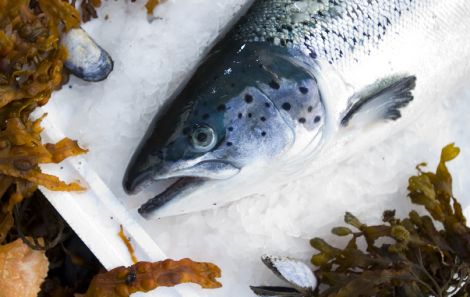News / Damning salmon industry report warns of ‘irrecoverable’ environmental damage
THERE may be “irrecoverable damage to the environment” if the impact of salmon farming isn’t addressed before the industry expands further, according to a new report from MSPs.
The Scottish Parliament’s environment committee found that the industry is not being regulated well enough and said there are “unacceptable” mortality rates in salmon farming.
The Scottish Salmon Producers Organisation (SSPO) said it is “determined to address any challenges to the sector” and said the industry continues to invest heavily in innovation and research.
The Scottish Greens said the report highlighted why there should be a moratorium on new salmon farm developments.
A total of 12 conclusions were included in the committee’s report, which is being passed to the parliament’s rural economy and connectivity committee.
The committee is not convinced that seals near fish farms are being shot only as a last resort – leading to concerns that exports may fall foul of the US marine mammal protection act, which prohibits the intentional killing or serious injury of marine mammals in all fisheries.
It recommends that the industry should fund independent research, and that any expansion is based on resolving environmental problems.
It adds that “there needs to be changes to current farming practice” and that there are “significant gaps in knowledge, data, monitoring and research around the adverse risk the sector poses to ecosystem functions”.
The report also says there has been a “lack of progress in tackling many of the key issues previously identified” despite the industry growing since.
There is also concern that the use of acoustic deterrent devices to fend off seals by transmitting a loud underwater noise is not effective and that they may be affecting cetaceans.
In 2016, £176 million worth of farmed salmon was produced in Shetland, with the isles accounting for 23 per cent of Scotland’s total weight.
Become a member of Shetland News
Farmed Atlantic salmon is Scotland’s largest food export, with fish worth £519 million exported last year between January and October.
But environmental worries over issues like pollution and sea lice have long remained.
Committee convenor Graeme Dey said there are concerns over how the industry’s “ambitious expansion targets” to double production over the next 10-15 years can be achieved in an environmentally sustainable way.
“The sector continues to grow and expand with little meaningful thought given to the impact this will have on the environment,” he said.
“In the committee’s view, if the current environmental impact issues are not addressed, the expansion will be unsustainable and may cause irrecoverable damage.
“The committee is supportive of aquaculture but expansion must be based on a precautionary approach and on resolving environmental problems. The status quo, in terms of approach and regulation, is not an option.”
The SSPO said it would comment in more detail once it has read the committee’s report in full.
“The industry takes this inquiry very seriously and has provided written and oral evidence to the committee to highlight our commitment to long-term sustainability through high standards of fish health, husbandry and environmentally responsible production,” it said.
“With investment of over £50m in new innovations and around £10m per year spent on research, it is clear that the Scottish salmon farming industry is proud of its achievement to become the UK’s top food export.
“We are determined to address any challenges to the sector maintaining that position.”
Scottish Greens environment spokesperson Mark Ruskell, however, believes the industry is at a “breaking point”.
“The salmon farming industry is breaking Scotland’s marine environment and aggressive expansion plans will damage it beyond repair,” he said.
“Salmon should be an iconic naturally produced food, but farming practice has become tarnished with widespread disease, chemical pollution and impacts on wild fish.
“This is a sector at breaking point driven by fantasy targets to double production by 2030 that bear no relation to the capacity of the environment to sustain that level of growth.
“The killing of protected seals and acoustic disturbance of dolphins is utterly unacceptable and it’s clear that Scotland faces a ban on all of our fisheries products to the United States unless these practices are banned.”
The rural economy and connectivity committee, meanwhile, is currently asking for views on Scotland’s salmon farming industry as part of its own inquiry into the sector’s future and how its challenges can be addressed.
Become a member of Shetland News
Shetland News is asking its many readers to consider paying for membership to get additional features and services: -
- Remove non-local ads;
- Bookmark posts to read later;
- Exclusive curated weekly newsletter;
- Hide membership messages;
- Comments open for discussion.
If you appreciate what we do and feel strongly about impartial local journalism, then please become a member of Shetland News by either making a single payment, or setting up a monthly, quarterly or yearly subscription.



























































